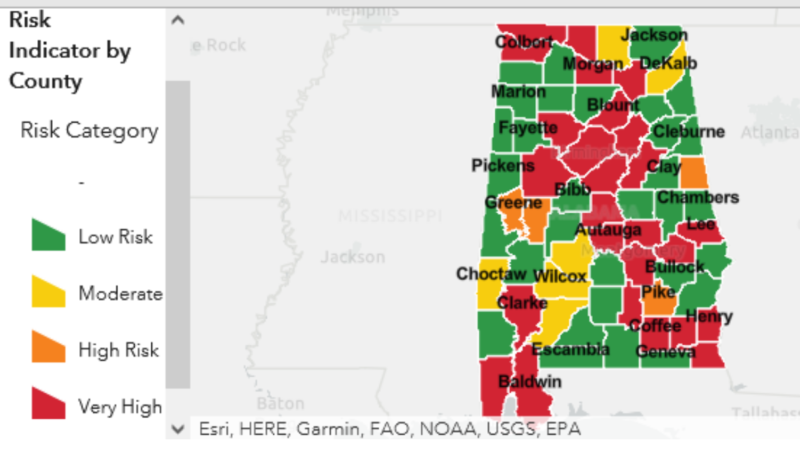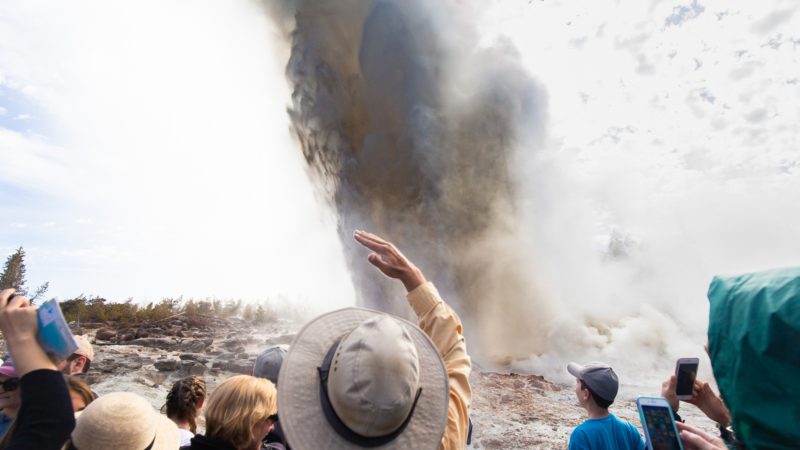Counties At Very High Risk Of COVID Spread Quadruples In 2 Weeks
The number of Alabama counties listed as being at “very high risk” for the spread of COVID-19 has quadrupled in the past two weeks, the state Department of Public Health reported Thursday.
ADPH listed six counties at ‘highest level of risk’ in its weekly report on June 24, but that total rose to 21 on July 1 and to 26 this week. The listings are based on statistics for the week ending the previous Saturday.
A county’s risk of COVID-19 spread is based on the number of new cases each day, calculated using the date of the onset of symptoms or the date a specimen was collected.
In addition to the counties listed as being at very high risk, four of the state’s 67 counties were listed as being at high risk, six at moderate risk and 31 at low risk.
The high-risk counties, spread across the state, are: Autauga, Baldwin, Blount, Chilton, Clarke, Coffee, Colbert, Crenshaw, Dale, Elmore, Henry, Houston, Jefferson, Lauderdale, Lee, Limestone, Macon, Marshall, Mobile, Montgomery, Morgan, St. Clair, Shelby, Talladega, Tuscaloosa and Walker.
Greene, Hale, Pike and Randolph counties were considered to be high risk.
Those shown as at moderate risk are Choctaw, Dallas, DeKalb, Madison, Monroe and Wilcox.
The number of new cases of the disease has grown statewide in recent weeks, reaching a total of 552,911 in Wednesday’s updated by ADPH. Alabama averaged 275 new cases a day over the past week, up from an average of 153 two weeks ago.
Mass trial shines a light on rape culture in France
A harrowing and unprecedented trial in France is exposing how pornography, chatrooms and men’s disdain for or hazy understanding of consent is fueling rape culture.
What’s your favorite thing about fall?
With cooler mornings and shorter days, if feels like fall is finally here. So what’s your favorite thing about fall? We put that question to people at our recent News and Brews community pop-up in Cullman.
Teammates LeBron and Bronny James make history as the NBA’s first father-son duo
The Jameses, who both play for the L.A. Lakers, shared the court for several minutes on the NBA's opening night. They join a very small club of father-son teammates in American professional sports.
After John le Carré’s death, his son had the ‘daunting’ task to revive George Smiley
Nick Harkaway grew up hearing his dad read drafts of his George Smiley novels. He picks up le Carré's beloved spymaster character in the new novel, Karla's Choice.
When Steamboat goes WHOOSH, scientists look for answers
What triggers geysers to go off is still not well understood. A new paper shows that one small earthquake likely triggered an eruption of the world's tallest active geyser, Steamboat.
Trump’s ex-chief of staff warns his former boss would rule like a ‘fascist’
John Kelly is one of several Trump-era White House officials to publicly criticize their former boss, arguing that Trump is not fit to hold office again.







